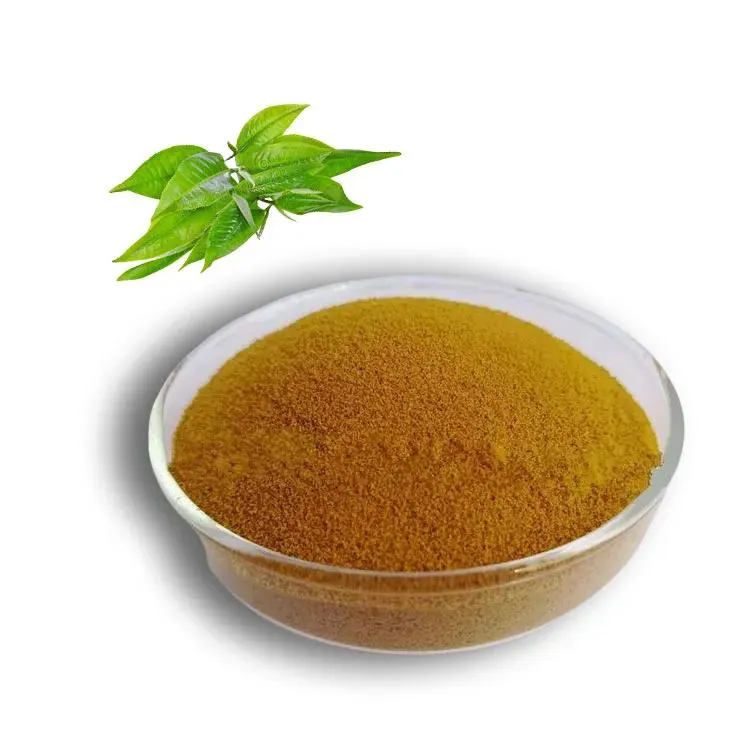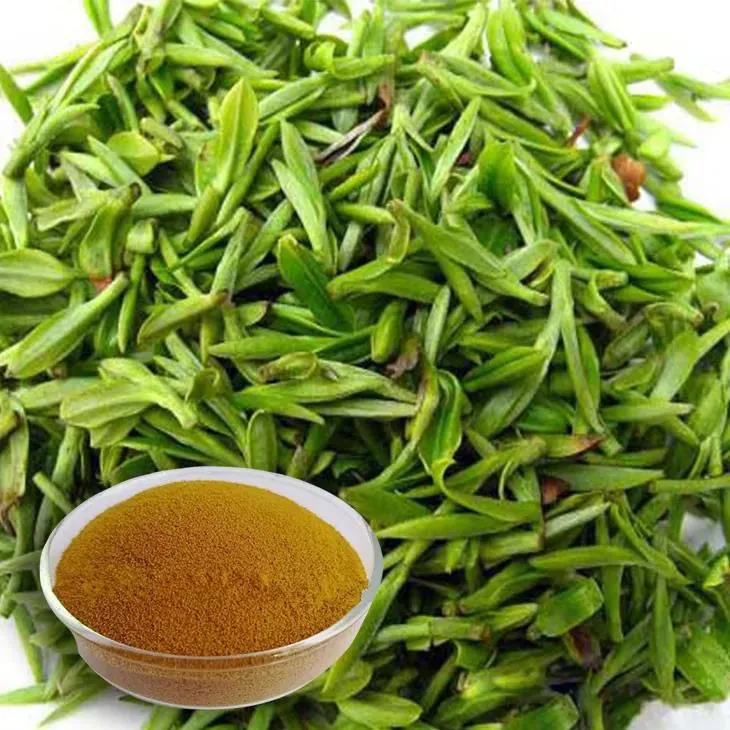- 0086-571-85302990
- sales@greenskybio.com
1 Navigating Dosage and Safety: A Comprehensive Guide to Green Tea Extract Consumption
2024-07-04

1. Introduction
Green Tea Extract has gained significant popularity in recent years due to its potential health benefits. It is rich in antioxidants, particularly catechins such as epigallocatechin - 3 - gallate (EGCG), which are believed to play a role in various aspects of health, including heart health, weight management, and cancer prevention. However, understanding the proper dosage and ensuring safety when consuming Green Tea Extract can be a complex matter. This comprehensive guide aims to provide detailed information on all aspects related to Green Tea Extract consumption, from recommended dosages for different health goals to potential interactions with medications and the importance of quality control.

2. Understanding Green Tea Extract
Green tea extract is derived from the leaves of the Camellia sinensis plant. The extraction process concentrates the active compounds found in green tea. These compounds include polyphenols, flavonoids, and caffeine. The main active component, EGCG, is known for its antioxidant and anti - inflammatory properties.
There are different forms of green tea extract available in the market, including capsules, tablets, and powders. The concentration of active ingredients can vary significantly between products, which is an important factor to consider when determining the appropriate dosage.

3. Recommended Dosages for Different Health Goals
3.1. General Health and Wellness
For general health promotion and antioxidant support, a dosage of 200 - 300 mg of green tea extract per day, containing approximately 50 - 100 mg of EGCG, may be sufficient. This can help boost the body's antioxidant defenses and potentially contribute to overall well - being.
3.2. Weight Management
When it comes to weight management, some studies suggest that a higher dosage may be beneficial. A dosage range of 400 - 600 mg per day, with around 150 - 200 mg of EGCG, has been investigated. However, it's important to note that green tea extract should be part of a comprehensive weight - loss plan that includes a healthy diet and regular exercise.
3.3. Heart Health
For heart health, a dosage of 300 - 400 mg per day, with an EGCG content of about 100 - 150 mg, may be recommended. Green tea extract may help in reducing cholesterol levels, improving blood vessel function, and decreasing the risk of heart disease.

4. Factors Affecting Dosage
4.1. Individual Tolerance
Individual tolerance to green tea extract can vary widely. Some people may be more sensitive to the caffeine content or other compounds in the extract. Those who are sensitive to caffeine may experience side effects such as jitters, increased heart rate, or insomnia at lower dosages. It's crucial to start with a low dosage and gradually increase it while monitoring for any adverse reactions.
4.2. Body Weight
Body weight can also play a role in determining the appropriate dosage. Larger individuals may require slightly higher dosages to achieve the same effects as smaller individuals. However, this should be adjusted based on individual tolerance and overall health.
4.3. Existing Health Conditions
People with certain health conditions may need to adjust their dosage or avoid green tea extract altogether. For example, individuals with liver or kidney problems should be cautious, as the extract may put additional strain on these organs. Pregnant or breastfeeding women should also consult their healthcare provider before using green tea extract, as its safety in these situations has not been fully established.
5. Potential Side Effects
While green tea extract is generally considered safe for most people when consumed in appropriate dosages, there are some potential side effects to be aware of.
- Caffeine - related side effects: As mentioned earlier, green tea extract contains caffeine. Excessive consumption can lead to symptoms such as nervousness, restlessness, increased heart rate, and difficulty sleeping. These effects are more likely to occur in individuals who are sensitive to caffeine or consume large amounts of the extract.
- Gastrointestinal issues: Some people may experience stomach upset, nausea, or diarrhea when taking green tea extract. This can be due to the irritation of the digestive tract by the compounds in the extract or individual sensitivity.
- Liver toxicity: In rare cases, high - dose or long - term use of green tea extract has been associated with liver toxicity. However, this is more likely to occur with very high dosages or in individuals with pre - existing liver conditions.
6. Interactions with Medications
Green tea extract can interact with certain medications, which is an important aspect of safety to consider.
- Blood - thinning medications: Green tea extract may increase the risk of bleeding when taken with blood - thinning medications such as warfarin. This is because some of the compounds in the extract can have anti - platelet effects, similar to aspirin.
- Medications for high blood pressure: The caffeine in green tea extract can potentially interact with medications used to treat high blood pressure. It may cause a temporary increase in blood pressure, reducing the effectiveness of the medication.
- Medications for diabetes: Green tea extract may affect blood sugar levels, and when taken with diabetes medications, it can lead to hypoglycemia (low blood sugar). This is especially important for individuals who are already on medications to control their blood sugar.
7. Quality Control
7.1. Product Selection
When choosing a green tea extract product, it's essential to select a reputable brand. Look for products that are manufactured in a facility that follows good manufacturing practices (GMP). This ensures that the product is produced under strict quality control standards.
7.2. Ingredient Purity
Check the label for information on ingredient purity. The product should clearly state the concentration of active ingredients, such as EGCG. Avoid products that contain excessive fillers, additives, or contaminants.
7.3. Third - Party Testing
Some high - quality green tea extract products undergo third - party testing. This provides an additional level of assurance that the product contains the stated ingredients in the correct amounts and is free from harmful substances. Look for products that display third - party testing logos or certificates.
8. Conclusion
Green tea extract can offer potential health benefits, but it's crucial to navigate its dosage and safety carefully. By understanding the recommended dosages for different health goals, being aware of potential side effects and interactions with medications, and ensuring quality control when selecting a product, consumers can use green tea extract in a safe and effective manner. As always, it's advisable to consult a healthcare provider before starting any new supplement regimen, especially if you have pre - existing health conditions or are taking medications.
FAQ:
What is the recommended dosage of green tea extract for general health benefits?
The general recommended dosage for green tea extract for basic health benefits is around 200 - 300 mg per day. However, this can vary depending on individual factors such as age, overall health, and diet. It's important to note that more is not always better, and exceeding the recommended dose may lead to potential side effects.
Can green tea extract interact with medications?
Yes, green tea extract can interact with certain medications. For example, it may interact with blood - thinning medications as it contains compounds that can affect blood clotting. It can also interact with some medications used to treat heart conditions and high blood pressure. Therefore, if you are taking any medications, it is crucial to consult your doctor before starting green tea extract supplementation.
How does quality control affect the safety of green tea extract?
Quality control is very important for the safety of green tea extract. High - quality green tea extract products are more likely to be pure, free from contaminants such as heavy metals and pesticides. They also tend to have accurate labeling regarding the dosage and ingredients. Poor - quality products may pose risks to health, including potential toxicity from contaminants or inaccurate dosages which could lead to ineffective use or overdose.
What are the potential side effects of taking too much green tea extract?
Taking excessive amounts of green tea extract may lead to side effects such as nausea, vomiting, diarrhea, and stomach cramps. It can also cause insomnia in some people due to its caffeine content. In more severe cases, it may lead to liver damage, although this is more likely with very high doses or in individuals with pre - existing liver conditions.
Is there a different dosage of green tea extract for weight loss?
For weight loss purposes, some studies suggest a dosage of around 400 - 500 mg per day. However, this should still be used with caution and under the supervision of a healthcare professional. Weight loss is a complex process and relying solely on green tea extract may not be sufficient. A balanced diet and regular exercise are also essential components of a weight loss plan.
Related literature
- Green Tea Extract: Chemistry, Antioxidant Properties and Health Benefits"
- "The Safety and Efficacy of Green Tea Extract in Humans"
- "Dosage Considerations for Green Tea Extract Supplements"
- ▶ Hesperidin
- ▶ Citrus Bioflavonoids
- ▶ Plant Extract
- ▶ lycopene
- ▶ Diosmin
- ▶ Grape seed extract
- ▶ Sea buckthorn Juice Powder
- ▶ Fruit Juice Powder
- ▶ Hops Extract
- ▶ Artichoke Extract
- ▶ Mushroom extract
- ▶ Astaxanthin
- ▶ Green Tea Extract
- ▶ Curcumin
- ▶ Horse Chestnut Extract
- ▶ Other Product
- ▶ Boswellia Serrata Extract
- ▶ Resveratrol
- ▶ Marigold Extract
- ▶ Grape Leaf Extract
- ▶ New Product
- ▶ Aminolevulinic acid
- ▶ Cranberry Extract
- ▶ Red Yeast Rice
- ▶ Red Wine Extract
-
Peppermint Oil
2024-07-04
-
Pueraria Lobata Extract
2024-07-04
-
Passionflower Extract
2024-07-04
-
Echinacea Extract
2024-07-04
-
White Peony Extract
2024-07-04
-
Tongkat Ali Extract
2024-07-04
-
Troxerutin
2024-07-04
-
Nutmeg Extract
2024-07-04
-
Tormentil Extract
2024-07-04
-
Tamarind extract powder
2024-07-04





















